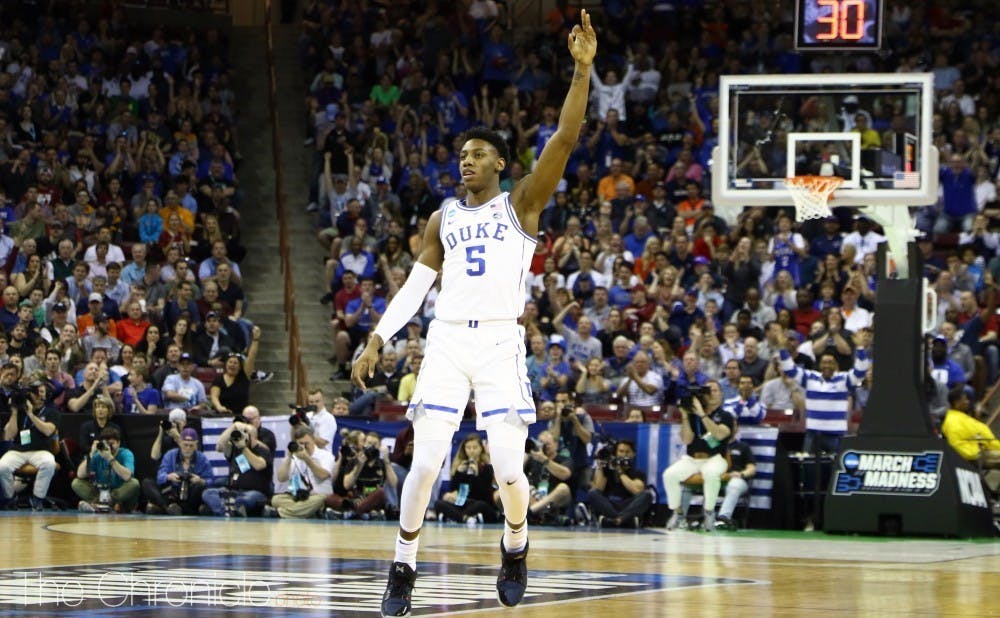As the FIBA World Cup concluded, Duke alumni saw both success and disappointment. The Blue Zone is here to dive into their performances once more:
Banchero provides cooler consistency after a hot start
Following a convincing rookie campaign and a solid opening to the tournament, expectations for Paolo Banchero’s impact coming off the bench were elevated. Though he did not put up any match-defining numbers, the young Orlando Magic star held his own throughout the second round. With eight points on 3-of-5 shooting against Montenegro and six points while going 3-of-4 from the field in a tough Team USA loss to Lithuania, Banchero provided strong efficiency amidst low volume.
The quarterfinals had Banchero and Team USA matched up against Italy — whom Banchero verbally committed to play for prior to his June decision to play for Team USA. After declaring that he would treat this match “like any other game” despite the controversy, the 2022 No. 1 overall pick put up eight points, five rebounds and two dimes in a blowout 37-point Team USA win.
Advancing to the semifinals against Germany, Banchero saw less success with his limited volume, shooting only 1-for-4 from the field but compensating with a 4-for-4 performance from the line. After what was ultimately an upset loss, Banchero and Team USA moved to close out the tournament with a bronze medal match against Canada. Unfortunately, Banchero was sidelined due to illness.
Ingram’s backseat improvements cut short
After disappointing performances and initial frustrations as a part of Team USA’s starting five, Brandon Ingram moved to find comfort coming off the bench. While he struggled against Montenegro with only two points in 15 minutes, Ingram eventually got more comfortable in his reduced role, leading to a 10-point performance in Team USA’s loss to Lithuania. The 2016 second-overall pick continued to find a place in the rotation in Team USA’s quarterfinal win, working his way to eight points, four rebounds and two assists. Unfortunately, his steadily increasing contributions without being the first option were cut short, as Ingram missed the squad’s final two games due to a respiratory illness.
Barrett struggles with efficiency but finishes strong
RJ Barrett’s career continues to be marked by inconsistent efficiency. Coming off a strong performance against Latvia, Barrett found himself struggling against Brazil, as he shot 1-for-8 from the field and 1-of-4 from deep. His contributions ramped up against Spain — a match where Barrett went for 16 points and five rebounds on an improved 6-of-12 shooting. Though his scoring improved, Barrett struggled with ball security, turning the ball over four times in Canada’s narrow three-point victory.
Barrett and Canada hoped to continue their tournament run as they encountered Slovenia in the quarterfinals Wednesday. The 6-foot-6 forward saw impact scoring on high volume, as he dropped 24 points and grabbed nine off the glass, coming up just shy of the double-double. However, this scoring is asterisked by one make on six attempts from behind the arc.
Friday’s semifinal match against Serbia saw Barrett come out with a strong 23-point game, though it was not enough to bring his team on top, as Canada fell in a nine-point loss. To cap off the tournament in an intense third-place match, Barrett might not have been the star — it is certainly hard to shine with two 30-point performances from his teammates — but he played a significant role in the squad’s nine-point overtime victory. The Mississauga, Ont., native contributed 23 points with a notable 4-for-8 shooting from three, including a game-sealing dagger with 44 seconds remaining in overtime. While the other contesting Blue Devils might not have had the chance to fight for their national team Sunday, Barrett rose to the occasion and helped lead Canada to clinch the bronze.
Get The Chronicle straight to your inbox
Signup for our weekly newsletter. Cancel at any time.

